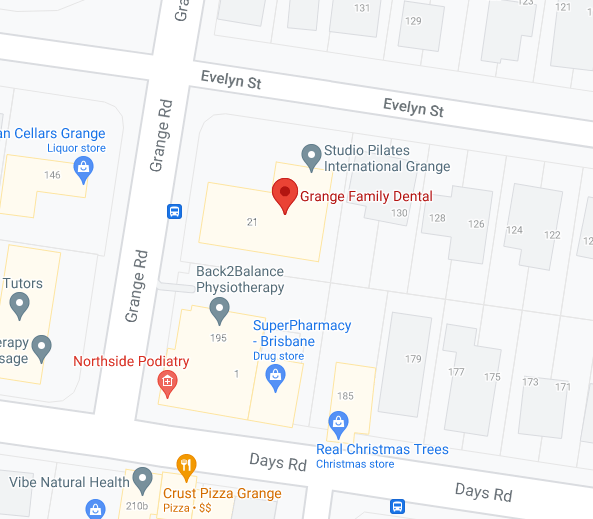Dental Implants Brisbane
Dental implant surgery can be a costly endeavour, which is why our team at Grange Family Dental, strives to offer reasonable rates without compromising our quality of care. By utilising our own in-house lab with state-of-the-art digital x-rays and scanners, we can offer start-to-finish implant placement in the one easy location, at our rooms in Grange, North Brisbane.
Implant placement can involve multiple steps, including placing a prosthetic tooth root, called an implant screw made from titanium, followed by a white ‘crown’ which can be made of highly aesthetic and very strong materials, and perfectly colour matched to your existing teeth. Sometimes bone or gum grafting may be required to help with strength, retention, and appearance. For precision and to ensure the perfect fit a surgical guide may help your dentist with placement of the tooth.
Grange Family Dental : Dental Implants in North Brisbane
At Grange Family Dental we can offer each of these steps on-site, helping us control the cost and quality of your work, and ensuring our affordable great rates come without any compromise on quality. We provide affordable dental implants in brisbane with warranties for all work performed, and our maintenance and service doesn’t stop after implant placement. As your general Dentist we will be watching our work and ensuring its performance for many years to come.
Our Dental Hygienists are here to support you with maintenance and care advice, meaning you are well-supported in all aspects of home care, giving you the longest possible life for your implant and natural teeth.
Other solutions for replacing missing teeth, such as bridges or dentures can feel less natural and be harder to maintain or clean. Implants allow you to eat, speak and maintain an oral health regimen as if you had never lost a tooth in the first place.
Finding Best Dental Implants Brisbane?
To begin your journey towards an easy to maintain, natural feeling dental implant, Ask our friendly staff for a consultation today.
Dental Implant Frequenty Asked Questions
Dental implants are commonly used in place of a tooth that has been lost. Dental implants are designed to look and feel just like your other teeth. Stage one is an artificial tooth root that is placed into your jawbone to create a strong, permanent foundation for a replacement tooth. Stage two is the white tooth crown which is placed over the screw, perfectly mimicking a natural tooth in terms of feel and look, with similar care requirements.
There are several reasons you might need dental implants. Irreversible damage leading to tooth loss is usually caused by poor oral hygiene, plaque and tartar build-up, tooth decay, or cracks and fractures around large old amalgam fillings. Gum disease or facial injuries which break or dislodge teeth are also very common.
Some people also have a genetic problem where some teeth fail to grow or develop in the first place.
All-on-four dentures are dentures held in place by four dental implants.
Depending on the location and number of missing teeth, dental implants can address many dental problems – not just cosmetic concerns.
Dental implants are a great solution to missing teeth, replacing dentures or bridges as Dentists’ preferred treatment option. If you lose a tooth and do not replace it, you can cause other issues such as poor aesthetics, and more force and damage to remaining teeth as they bear more of the brunt of the extra work. In fact, with each tooth lost, the chances of losing further teeth increases. Cosmetic issues of tooth loss are not just limited to visible gaps or spaces.
The loss of multiple teeth can cause wrinkles and lines to form around the edges of your mouth, as the skin doesn’t have as many teeth to stretch it out, and the vertical height of your face may shorten. Shrinking of the underlying bone that was supporting the tooth may exacerbate this look of premature aging. Well-placed dental implants can improve not just your function and nutrition, but also make you appear younger and improve facial symmetry.
Most people who have had dental implant surgery have reported little to no discomfort during the procedure. To insert the dental implant, we always use local anaesthetic to numb the area. If you have discomfort following the implant, general over-the-counter pain medication for 1-2 days is usually all that is required.
At Grange Family dental, your comfort is of the utmost importance to us, so we offer full after-hours support with an emergency phone number provided to all patients who have undergone a procedure. You can rest assured you will be supported and cared for throughout your journey to a new tooth and into the future.
With proper maintenance and care, dental implants can last for more than 25 years. Dental implants were designed to be a permanent solution to missing teeth and as a result, can support the dental structure and withstand general eating/biting actions. You can make the most out of your dental implants by practicing perfect oral hygiene, seeing your dentist for regular check-ups and avoiding habits that may affect your implant such as chewing on hard items.
Our lovely team of dental hygienists are well-placed to offer you personalised advice on implant care and maintenance you can carry out at home to ensure your implant lasts for many years.
All on 4 Dental Implants Brisbane
All-on-4 dental implants are a whole set of upper or lower teeth that rest on 4 dental implants. The four titanium implants support a fixed dental prosthesis with 10 to 14 teeth.
The benefits of these over regular dentures are much better retention meaning you can chew and smile with confidence that your denture will not dislodge.
Traditional dentures were supported by either the remaining teeth or the gums. The dentures helped speed up wear and tear on the remaining teeth, meaning patients gradually lost more teeth. As the support dwindled, their denture became looser.
Introducing implants under the denture to anchor the denture down greatly increases the retention and stability, so your ability to chew with them. Implant retained dentures are less bulky, giving you better mouth feel and ability to taste food and enjoy its texture and temperature without thick plastic covering your soft tissues and rubbing while you chew.
Often dentures sitting on nothing but gum will float around with little resistance resulting in difficulty in chewing/biting. When an implant is introduced underneath the denture, it can be joined to the denture via a “ball and socket” joint (or other designs) which allows the denture to grip onto the implant. As the implant is fixed to the jaw, the denture will no longer be able to move around.








